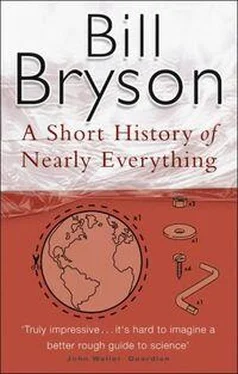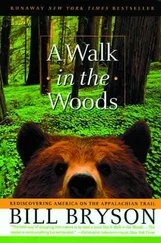“He became a leading member . . .” McPhee, Basin and Range , p. 99.
“quotations from French sources . . .” Gould, Time’s Arrow , p. 66.
“A third volume was so unenticing . . .” Oldroyd, Thinking About the Earth , pp. 96-97.
“Even Charles Lyell . . .” Schneer (ed.), Toward a History of Geology , p. 128.
“In the winter of 1807 . . .” Geological Society papers: A Brief History of the Geological Society of London .
“The members met twice a month . . .” Rudwick, The Great Devonian Controversy , p. 25.
“(As even a Murchison supporter conceded . . . )” Trinkaus and Shipman, The Neandertals , p. 28.
“In 1794, he was implicated . . .” Cadbury, Terrible Lizard , p. 39.
“known ever since as Parkinson’s disease.” Dictionary of National Biography , vol. 15, pp. 314-15.
“convinced that Scots were feckless drunks.” Trinkaus and Shipman, p. 26.
“Once Mrs. Buckland found herself being shaken awake . . .” Annan, The Dons , p. 27.
“His other slight peculiarity . . .” Trinkaus and Shipman, p. 30.
“Often when lost in thought . . .” Desmond and Moore, Darwin , p. 202.
“but it was Lyell most people read . . .” Schneer, p. 139.
“and called for a new pack . . .” Clark, The Huxleys , p. 48.
“Never was there a dogma . . .” Quoted in Gould, Dinosaur in a Haystack , p. 167.
“He failed to explain . . .” Hallam, Great Geological Controversies , p. 135.
“the refrigeration of the globe . . .” Gould, Ever Since Darwin , p. 151.
“He rejected the notion . . .” Stanley, Extinction , p. 5.
“one yet saw it partially through his eyes . . .” quoted in Schneer, p. 288.
“De la Beche is a dirty dog . . .” Quoted in Rudwick, The Great Devonian Controversy , p. 194.
“the perky name of J. J. d’Omalius d’Halloy.” McPhee, In Suspect Terrain , p. 190.
“to employ ‘-synchronous’ for his endings . . .” Gjertsen, p. 305.
“in the ‘tens of dozens.’ ” McPhee, In Suspect Terrain , p. 50.
“Rocks are divided into quite separate units . . .” Powell, p. 200.
“I have seen grown men glow incandescent . . .” Fortey, Trilobite! p. 238.
“When Buckland speculated . . .” Cadbury, p. 149.
“The most well known early attempt . . .” Gould, Eight Little Piggies , p. 185.
“most thinking people accepted the idea . . .” Gould, Time’s Arrow , p. 114.
“No geologist of any nationality . . .” Rudwick, p. 42.
“Even the Reverend Buckland . . .” Cadbury, p. 192.
“between 75,000 and 168,000 years old.” Hallam, p. 105; and Ferris, Coming of Age in the Milky Way , pp. 246-47.
“the geological processes that created the Weald . . .” Gjertsen, p. 335.
“The German scientist Hermann von Helmholtz . . .” Cropper, p. 78.
“and written (in French and English) a dozen papers . . .” Cropper, p. 79.
“At the age of twenty-two he returned to Glasgow . . .” Dictionary of National Biography , supplement 1901-1911, p. 508.
CHAPTER 6 SCIENCE RED IN TOOTH AND CLAW
“who described it at a meeting . . .” Colbert, The Great Dinosaur Hunters and Their Discoveries, p. 4.
“the great French naturalist the Comte de Buffon . . .” Kastner, A Species of Eternity, p. 123.
“A Dutchman named Corneille de Pauw . . .” Kastner, p. 124.
“. . . in 1796 Cuvier wrote a landmark paper . . .” Trinkaus and Shipman, p. 15.
“Jefferson for one couldn’t abide the thought . . .” Simpson, Fossils and the History of Life , p. 7.
“On the evening of January 5, 1796 . . .” Harrington, Dance of the Continents , p. 175.
“The whys and wherefores . . .” Lewis, The Dating Game , pp. 17-18.
“Cuvier resolved the matter to his own satisfaction . . .” Barber, The Heyday of Natural History , p. 217.
“In 1806 the Lewis and Clark expedition . . .” Colbert, p. 5.
“the source for the famous tongue twister . . .” Cadbury, p. 3.
“The plesiosaur alone took her ten years . . .” Barber, p. 127.
“Mantell could see at once it was a fossilized tooth . . .” New Zealand Geographic , “Holy incisors! What a treasure!” April-June 2000, p. 17.
“the name was actually suggested to Buckland . . .” Wilford, The Riddle of the Dinosaur , p. 31.
“Eventually he was forced to sell . . .” Wilford, The Riddle of the Dinosaur , p. 34.
“the world’s first theme park.” Fortey, Life , p. 214.
“he sometimes illicitly borrowed limbs . . .” Cadbury, p. 133.
“a freshly deceased rhinoceros filling the front hallway . . .” Cadbury, p. 200.
“some were no bigger than rabbits . . .” Wilford, The Riddle of the Dinosaur , p. 5.
“the one thing they most emphatically were not . . .” Bakker, The Dinosaur Heresies , p. 22.
“dinosaurs constitute not one but two orders . . .” Colbert, p. 33.
“He was the only person . . .” Nature , “Owen’s Parthian Shot,” July 12, 2001, p. 123.
“his father’s ‘lamentable coldness of heart.’ ” Cadbury, p. 321.
“Huxley was leafing through a new edition . . .” Clark, The Huxleys , p. 45.
“His deformed spine was removed . . .” Cadbury, p. 291.
“not quite as original as it appeared.” Cadbury, pp. 261-62.
“he became the driving force . . .” Colbert, p. 30.
“Before Owen, museums were designed . . .” Thackray and Press, The Natural History Museum , p. 24.
“to put informative labels on each display . . .” Thackray and Press, p. 98.
“lying everywhere like logs . . .” Wilford, The Riddle of the Dinosaur, p. 97.
“repeatedly taking out and replacing his false teeth.” Wilford, The Riddle of the Dinosaur , pp. 99-100.
“it was an affront that he would never forget.” Colbert, p. 73.
“increased the number of known dinosaur species . . .” Colbert, p. 93.
“Nearly every dinosaur that the average person can name . . .” Wilford, The Riddle of the Dinosaur , p. 90.
“Between them they managed to ‘discover’ . . .” Psihoyos and Knoebber, Hunting Dinosaurs , p. 16.
“obliterated by a German bomb in the Blitz . . .” Cadbury, p. 325.
“much of it was taken to New Zealand . . .” Newsletter of the Geological Society of New Zealand , “Gideon Mantell-the New Zealand connection,” April 1992, and New Zealand Geographic , “Holy incisors! What a treasure!” April-June 2000, p. 17.
“hence the name.” Colbert, p. 151.
“the Earth was 89 million years old . . .” Lewis, The Dating Game , p. 37.
“Such was the confusion . . .” Hallam, p. 173.
CHAPTER 7 ELEMENTAL MATTERS
Читать дальше












